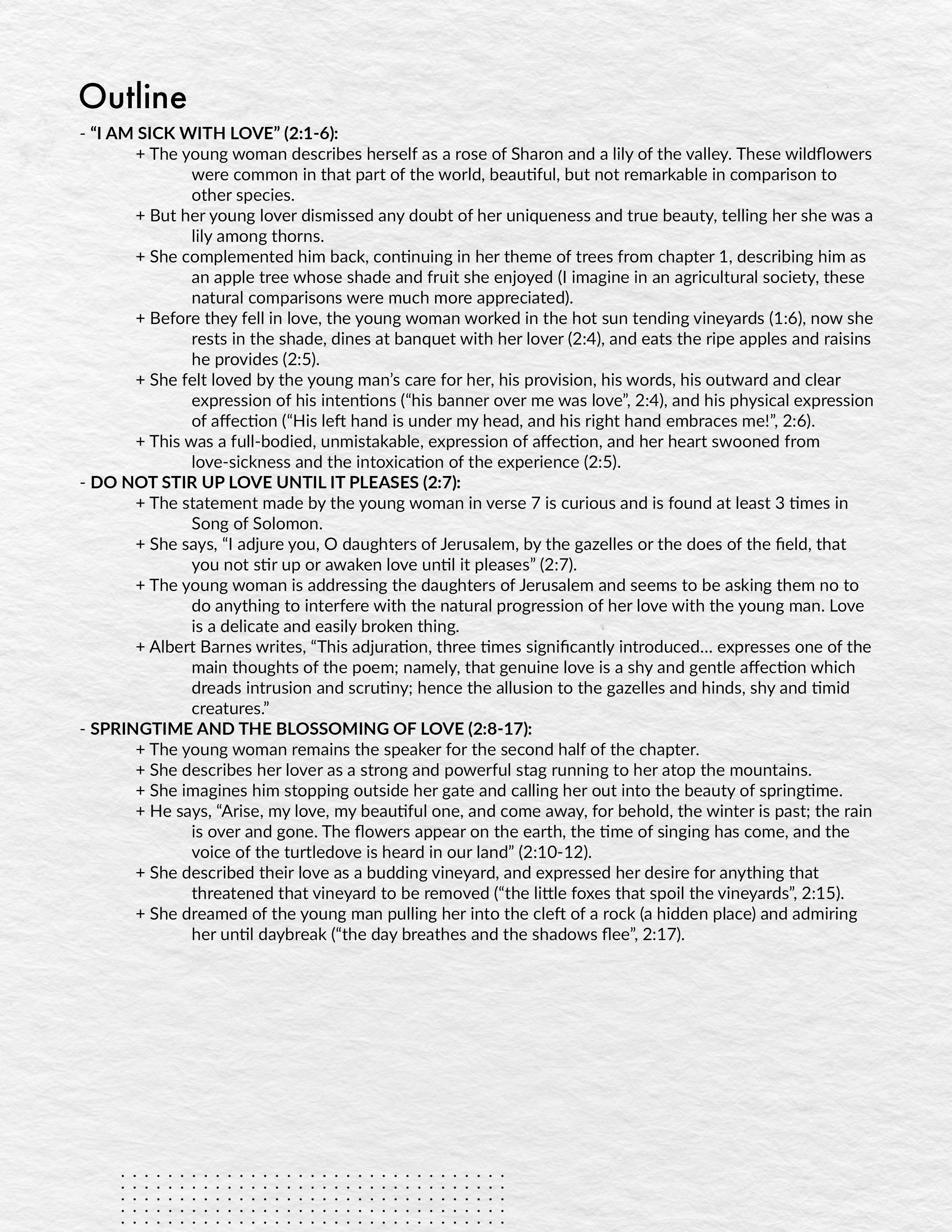Song of Solomon 2 - Bible Study in 5 Minutes
Song of Solomon 2 Short Summary:
The young woman is the primary speaking in Song of Solomon 2. She tells the reader how her heart is sick with love and overwhelmed by affection for her young man. He provides for her, pursues her, complements her, and gives himself entirely to her, leaving her with no doubt that his love is as ardent as hers.
Song of Solomon 2 Bible Study
AUTHOR:
Solomon, the son of David, wrote the Song of Songs (1:1).
He is a fitting author, especially considering 1 Kings 4:32 tells us he wrote 1,005 songs.
Solomon is named in multiple locations within the song.
KEY CHARACTERS:
The Young Woman – A beautiful Shulamite woman who is the object of the young man’s affections.
The Young Man – A handsome young man, Solomon, who is the object of the young woman’s affections.
Daughters of Jerusalem – These women interject supplementary comments into the dialog between the young man and woman.
DEFINITIONS:
Rose of Sharon (1:1) – This was not the Hibiscus Syriacus which has taken on the name, but more likely a tulip like flower that grew wild on the Plain of Sharon. The Plain of Sharon is a flat piece of land near the coast of the Mediterranean Sea, just south of Mt. Carmel.
OUTLINE:
“I AM SICK WITH LOVE” (2:1-6):
The young woman describes herself as a rose of Sharon and a lily of the valley. These wildflowers were common in that part of the world, beautiful, but not remarkable in comparison to other species.
But her young lover dismissed any doubt of her uniqueness and true beauty, telling her she was a lily among thorns.
She complemented him back, continuing in her theme of trees from chapter 1, describing him as an apple tree whose shade and fruit she enjoyed (I imagine in an agricultural society, these natural comparisons were much more appreciated).
Before they fell in love, the young woman worked in the hot sun tending vineyards (1:6), now she rests in the shade, dines at banquet with her lover (2:4), and eats the ripe apples and raisins he provides (2:5).
She felt loved by the young man’s care for her, his provision, his words, his outward and clear expression of his intentions (“his banner over me was love”, 2:4), and his physical expression of affection (“His left hand is under my head, and his right hand embraces me!”, 2:6).
This was a full-bodied, unmistakable, expression of affection, and her heart swooned from love-sickness and the intoxication of the experience (2:5).
DO NOT STIR UP LOVE UNTIL IT PLEASES (2:7):
The statement made by the young woman in verse 7 is curious and is found at least 3 times in Song of Solomon.
She says, “I adjure you, O daughters of Jerusalem, by the gazelles or the does of the field, that you not stir up or awaken love until it pleases” (2:7).
The young woman is addressing the daughters of Jerusalem and seems to be asking them no to do anything to interfere with the natural progression of her love with the young man. Love is a delicate and easily broken thing.
Albert Barnes writes, “This adjuration, three times significantly introduced… expresses one of the main thoughts of the poem; namely, that genuine love is a shy and gentle affection which dreads intrusion and scrutiny; hence the allusion to the gazelles and hinds, shy and timid creatures.”
SPRINGTIME AND THE BLOSSOMING OF LOVE (2:8-17):
The young woman remains the speaker for the second half of the chapter.
She describes her lover as a strong and powerful stag running to her atop the mountains.
She imagines him stopping outside her gate and calling her out into the beauty of springtime.
He says, “Arise, my love, my beautiful one, and come away, for behold, the winter is past; the rain is over and gone. The flowers appear on the earth, the time of singing has come, and the voice of the turtledove is heard in our land” (2:10-12).
She described their love as a budding vineyard, and expressed her desire for anything that threatened that vineyard to be removed (“the little foxes that spoil the vineyards”, 2:15).
She dreamed of the young man pulling her into the cleft of a rock (a hidden place) and admiring her until daybreak (“the day breathes and the shadows flee”, 2:17).
APPLICATION
How does love blossom, grow, and flourish? If you’re a man, like myself, and you want to cultivate a vineyard of love with a girl in the future, or your current love, or your wife, how do you do that?
I think the young woman gives us a pretty good formula for a thriving vineyard in the opening of this book!
What was it that put her in the trance of love-sickness?
(1) The young man’s care and provision for her (2:3).
(2) His uplifting words and complements (1:15, 2:2).
(3) His outward and clear expression of his intentions (2:4).
(4) Their dedication to one another and no other (2:16).
(5) His strength and virality (2:8).
(6) His physical affection (2:6).
(7) His presence and giving her his unique attention (2:14).
(8) His pursuit of her (2:9-10).

